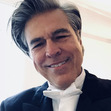"They Used To Call Me G"
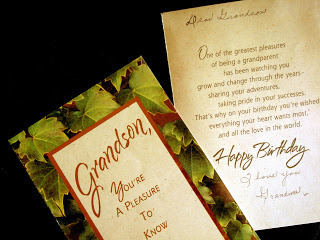 "One has lived if one has loved."
"One has lived if one has loved."-North Face
2008, German Film
based on a true story
On December 8, 2010 my cousin Liz Lucero wrote:
Fifteen years ago I wrote this paper. It is an oral history told to me by my grandmother for a school project. It mostly centers on her youth during the Great Depression and how it affected her life. All the quotes in this paper are her exact words.
"They Used To Call Me G"
An ORAL HISTORY
by Liz Lucero-Muise
In 1913 Woodrow Wilson was President, the fox trot was the popular dance of the day and the suffragettes were marching down Washington's Pennsylvania Avenue. Meanwhile in the quiet little mining town of Cerrillos, New Mexico, on July 10th Genevieve Leyba was born. She was eighth of nine children born to Vitalia and Luis Leyba. Her mother had a handful to deal with so Genevieve's Aunt Rosarito took her in for the next thirteen years. Even at the tender age of one, Genevieve embarked on a lifestyle that kept her continually on the go.
PHOTO: Cerrillos, NM
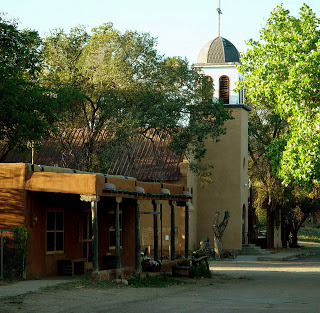 Her first trip took her eighty-five miles away to Las Vegas, New Mexico where her Aunt Rosarito lived. Rosarito's only son was serving as a sergeant in WWI which enabled her to care for Genevieve.
Her first trip took her eighty-five miles away to Las Vegas, New Mexico where her Aunt Rosarito lived. Rosarito's only son was serving as a sergeant in WWI which enabled her to care for Genevieve."My Aunt used to say very pretty stories. You know my Aunt Rosarito the one that I was…liked to say I was adopted. I stayed so long with her you know."
Genevieve eventually returned to Cerrillos, NM to live with her parents. She recalls they were not very poor.
"I had everything I wanted. I was always dressed nice and everything. My father had a lot of cows so we didn't go through that (hard times) during the Depression you know. My father used to kiss the cows. We used to sell the meat and everything at that time. He used to sell it for maybe twenty-five cents a pound or sell a complete cow."
Her father's job was to take water in the tank he had by wagon train to the people on the other side of town.
Vitalia was a midwife and delivered all but one of Genevieve's nine children. Vitalia worked very hard. She would grind the wheat to make tortillas. She was also deeply concerned with cleanliness.
"I remember I had a pretty white cat but my mother was very clean you know and she had this bedspread and the cat went and that was the end of the cat. My mother was very clean you know she even had carpet on the toilets outside—she had carpet and wallpaper on those toilets outside. She couldn't see a leaf on the ground. She would pick it up. Yeah, she used to work a lot. She used to do everything. Always sweeping and sweeping all the time. She did her housework and cooked and everything. At that time we used to eat breakfast in the morning about six o'clock and in the afternoon it had to be at twelve o'clock and in the evening it had to be at five o'clock because the miners you know they have like a whistle and we used to hear everything. If they were going to work sometimes they set four whistles (that meant) all the mine was gonna work and sometimes three and so on. So we had to eat at that time."
Genevieve was named after a sister who had gotten burned during Lent.
"She was gonna throw the ashes from the stove and you know her dress got… Well, it wasn't that much that she burned but the smoke that she inhaled. And that was her name. It was Genevieve."
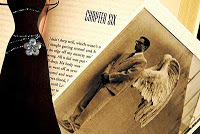 "I used to read a lot which I do today. I used to read a lot of true stories and things like that. Because I was spoiled I never did help my mother—you know—not like my sister. My sister was with my other sister and she used to help her because she had a lot of kids you know. But I didn't."
"I used to read a lot which I do today. I used to read a lot of true stories and things like that. Because I was spoiled I never did help my mother—you know—not like my sister. My sister was with my other sister and she used to help her because she had a lot of kids you know. But I didn't."In 1926, Genevieve stayed in Denver with her mother for about six months while her oldest sister, Pina, was hospitalized. It was there in the big city of Denver that she would see the flappers dance live on stage before a movie.
"Like in Las Vegas they used to dance there."
After her short stay in Denver it was back to Cerrillos again. Genevieve recalls Cerrillos as a very quiet place where there was nothing to do. Even though it was a very boring town, Genevieve lived life to the fullest. She indulged in her passion of dancing. If there was a dance, Genevieve, was sure to be there.
"Yeah, I was very popular in dancing and everything. They used to call me "G" all the time. Yeah, me and my sister were very popular. My sister used to play basketball. She was a guard."
She was very close with her younger sister, Celia.
In school Genevieve enjoyed New Mexico History, Geography and just about all of her classes except Math. The teachers especially liked her handwriting. In fact, she would help out the teachers with writing in their grade books.
"We learned English and Spanish in school. I learned how to write in Spanish and we talked English there. But at home we spoke Spanish."
Genevieve managed to get into just a little trouble while in school.
"One time we were passing by and one of my friends' mother had some wine so I drank some wine and I guess I got a little tipsy and went to school. And they noticed me that I was drunk so they took me to where the first grade was to cut the paper dolls which I know—do you know? There's where I learned how to cut. That was the first time. I don't know how they noticed me right away. They never told my mother or father anything."
Genevieve recalls another incident.
"I used to hit all the girls there in school. We used to get mad or sometimes when my sister played some of the girls were rough and I would jump right away for my sister. And at school, too, you know sometimes I used to even hit the teachers. I used to get mad. I used to have a bad temper. And sometimes we played hooky. Well, the teacher was gonna tell my father but I just…that's one thing with me…I used to make it up so good that my parents didn't understand."
"My father and mother were very good. Oh yeah, they were very strict. We had to be in at seven-thirty. We used to go to choir but we had to be a certain hour there. They were very strict with me. I sang in the choir, yeah, and it was just--you know--the church was near my house opposite us so we used to go to choir. But sometimes we went out. So if we stayed long you know we'd get into trouble. And sometimes my father had a little strap—you know—and then he used to hit my sister and I used to have a heavy coat on and then I used to laugh about my sister. I used to (make gestures in the background) and then my sister used to say 'eeeh my name she's laughing about me'. I'm not laughing and it's just because we came late—you know."
Genevieve lights up when she talks about all of the dances that she had a chance to go to. She was allowed to go to dances only one Saturday a month.
"Oh yeah, I really liked to dance. In fact, me and my sister were the ones that started the band. Sometimes I told my sister I'm gonna see who's going to start first. Sometimes she did and sometimes I did. So we had a good time—you know."
In the dances that were held in Madrid, New Mexico orchestras from Albuquerque usually played American music. The dances that were held in Cerrillos were played in Spanish by the musicians.
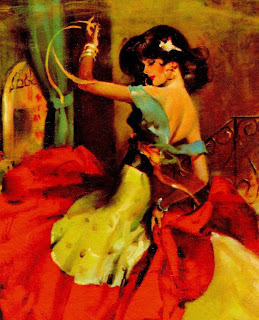
There were times when Genevieve tried to sneak past her parents so she could go to a dance.
"Sometimes when my father didn't let me go I used to get my pearls and then my mother used to say—'Well, I don't know if your father lets you'. And then my father says if your mother lets you. So I had to go. So I used to tell him yeah my mother said if you let me. My sister used to play in Santa Fe, so I used to go with her and everything. But one time we wanted to go to the dance there so we hide the clothes. We made it up and I said you hide the clothes on the porch of my mother. So we went to the dance. But there was another girl that came to invite us and she said well, no there was no game—you know—so then, my sister told my father, so we really got it—Oh boy."
"In September, we used to go to the fiestas in Santa Fe. They had the Fiestas de Vargas. It was maybe about a week and we used to go sometimes three days—you know. We used to go around there, watch everything, all the people there. I remember one time we went to the fiestas and my mother gave us a dollar that time. I didn't even want to waste them—but then I was going around with your Grandpa then and he asked us if we wanted to go eat and I was that kind of person that I didn't like somebody to take me to eat. I said if I ever get mad with him he might tell me 'I took you to eat'. So I was that kind of person."
"But we didn't have no dances until Good Saturday. It's not like now—you know—there are dances during Lent—you know." Over there all the people were very Catholic. They used to go to Church every Sunday."
Genevieve remembers what Christmas was like.
"My mother used to buy everybody gifts. No, we never did have a tree you know—just a nativity. No, at that time they didn't put no Christmas trees—that I remember. Nobody did. In Madrid…yeah. Oh, that was beautiful. Everything was so pretty there. Everybody—even people from New York—used to come and see that because it was beautiful. We used to get candy and we used to sometimes get a dress. My mother used to buy me a dress—you know—for the dance and everything. A dress that my mother bought me—it was velvet, like burgundy wine. I used to like that dress and I used to take it all the time…even summer I wanted to wear it."
"The styles were very nice at that time, not very short—you know—kind of long. And the dresses were cheap! You could send for a dress for three dollars at Montgomery Ward's and it was beautiful silk and everything or a suit."
At age sixteen, Genevieve met Fidel Lucero. He lived on the other side of town. During their courtship Fidel stayed in South Dakota for two years but continually wrote her letters. At the age of twenty, Genevieve and Fidel were finally married. One thing was for sure after her marriage, there was to be no more dances. Fidel was not the type to party and socialize like Genevieve.
"He never did like to travel—not even to a restaurant. And his brother was the same way."
It turned out that her sister, Celia, married Fidel's brother, Reynaldo.
The year was 1933 and the country was in the middle of the Great Depression. After they got married Fidel worked for the Railroad but soon after got laid off. It was then that her husband had to go to California to work in the shipyards. Genevieve stayed on in New Mexico, awaiting his return home.
She would visit him in California from time to time. She wanted to help him in the shipyards.
"In the shipyards—you know—you had to…well, everybody was working there. You could find a job there because they used to teach you how."
She knew that other women were working alongside the men there.
"He was jealous, but it was okay for him. All my sisters worked and my nieces. Everybody worked but not me. You know—everybody tells me did you work. No I never did work—your Grandpa didn't let me work. Well, I had to take care of the kids and everything, look for a babysitter and everything."
She felt bad but couldn't say anything.
"No, I never worked. I wanted to work but like he told me 'you work too much with the kids'. He told me 'when I die then you can work'."
The only job she did have was babysitting for a short while when she lived in California but-even then-her husband didn't like it.
Franklin Roosevelt was the first President Genevieve voted for. Her father was Republican as was most of the State prior to Roosevelt's Presidency.
"My father was Republican, but your Grandpa was Democrat. All his family were Democrats. So I voted Democrat. So I've been a Democrat since then."
Photo: FDR, 1940
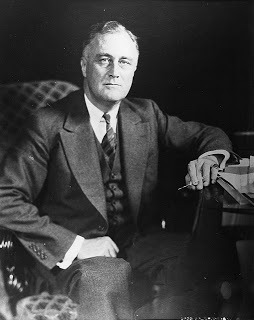
"During the war we had stamps for the food, for the sugar, for the shoes and everything. And sometimes I didn't have enough, so I used to give my mother for the sugar. She used to bake and she used to give me the stamps for the kids to get their shoes. We had the stamps for meat, too—you know. So, we were the same. The rich couldn't buy. We were all equal."
Her husband, Fidel, came back to Cerrillos after his shipyard job was finished. They lived in the Domingo Reservation where their rent was only twelve dollars per month.
"At the time everything was cheap. At that time during the war you could buy a loaf of bread for ten cents, a pack of cigarettes for ten cents, eggs for seven cents a dozen. I didn't get a radio until I got married. I had big radio—you know—when we first got married. I sent for it at SPIEGEL—but it was with batteries. So if I didn't have enough like I used to watch those stories and if I didn't have enough I used to go to my friend there…I had a friend there in Domingo."
She used to enjoy listening to the radio shows such as MA PERKINS, STELLA DALLAS and DRAGNET.
Genevieve had nine children (six boys and three girls).
"Grandpa was very strict—you know—but I used to do for the kids all the time. But you should have seen when your Grandpa used to come home. Oh…they looked like angels—yeah, they were so good—you know. Once they seen him passing the overpass over there—Oh, they were angels. But when he left next Monday they disappeared—even the dog disappears—yeah, even the dog disappeared."
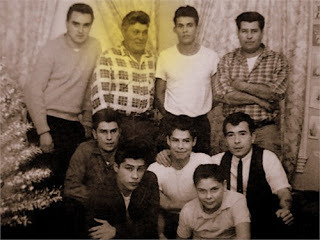 The year is 1960 and once again Genevieve packs her bags. This time she and her family move to California.
The year is 1960 and once again Genevieve packs her bags. This time she and her family move to California."Oh I liked it here right away because my sons were here. All My Children were here already—you know."
Her husband didn't have to serve in WWII because he worked in the mines and received a deferment. Two of Genevieve's sons were not so luck when the Vietnam War broke out. Knowing her son's lives were in jeopardy put a great hardship on Genevieve. She worried plenty and prayed daily. She also became sick with ulcers.
"I went through a lot with my kids—trouble here, trouble there. You know what I say, sometimes I say, I wish I would have been a nun. Life would have been better. Maybe I would have had a better life. You know when you have a lot of kids like that—but you know you go through a lot—especially now—things are happening so much with kids. I always say I should have been a nun. No, I didn't expect such a big family, but I love my kids. They're so good with me."
It wasn't until Genevieve turned sixty-two (1975) that she requested her Birth Certificate to apply for her husband's Social Security. That was when she found out her legal First Name was actually MARIA.
Genevieve joined a Senior Citizens group shortly after her husband suddenly passed away (1978). Her life has become more focused on the kind of socializing she enjoyed so much when she was a young woman. She is always out and about. She takes the bus or gets a ride. She never did learn how to drive a car.
"I regret it now that I don't drive. Betty says 'if you had one…I can't find you now'."
There are about thirty people in her Senior Citizens Group.
"We play BINGO there and then I make these books for the handicapped kids. They really enjoy it. I put Christmas Cards or Easter Cards…and I put them very, very nice. Everything to match…they enjoy it. They sit down and look at the pictures—you know. So a lot of people bring cards there and I put them in the book. But I have compliments because I put everything that matches and every kind of nationality. Dora tells me, she's the Director. They really liked them because one of the teachers said so. Well, I used to cut. We used to make things like that. I have to train them because some people don't know how to cut and I'm very—you know. So, that's what I do. It's nice. I have a good time there."
Photo: Mary Genevieve Leyba-Lucero
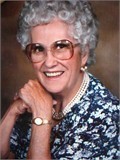
Genevieve has been many places.
"I have traveled quite a bit."
She's been to Maui, Waikiki, Puerto Vallarta, Los Angeles and Seattle. In July 1995, Genevieve took a trip to Las Vegas, Nevada. It was a birthday treat from her youngest son, John Raymond, and two of her daughters (Betty and Virginia) came along. They went to the TREASURE ISLAND Casino.
"We passed through where an elephant was—you know…a bronze elephant. And Betty says 'Let's touch it—you know—maybe we'll get lucky' and I touched it."
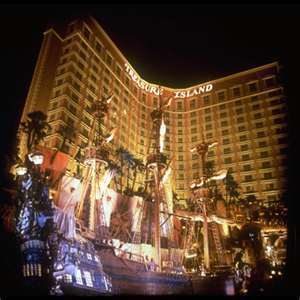
Genevieve had the magic touch that day. She had just put in six nickels in the nickel machine and found herself knee deep in silver. She had hit the biggest jackpot in Nevada from a nickel machine. She won a whopping $257,000 (two-hundred and fifty-thousand dollars).
"Oh you should have seen all the people! I got so excited! Virginia was there near me—you know—and then when I got it I seen it—you know—and it was the four NEVADA nickels. I'm the first one in California that got the NEVADA nickels. You should have seen all the people hugging me. Everybody came to my machine and then they asked me if I wanted to drink something. I even said YEAH, I WANT A MARGUERITA. So they sent me several pictures—you know—and they put a picture over there..The big one. The first thing they gave me was the income tax."
PHOTO: Virginia, Betty, Mary Genevieve, John Raymond
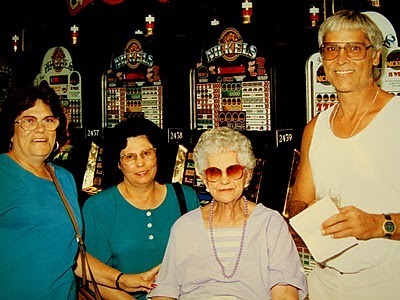 Genevieve has experienced many joys and heartbreaks along her journey in life. From the dusty roads of Las Vegas, New Mexico to the bright lights of Las Vegas, Nevada. Genevieve had always embraced life to the fullest.
Genevieve has experienced many joys and heartbreaks along her journey in life. From the dusty roads of Las Vegas, New Mexico to the bright lights of Las Vegas, Nevada. Genevieve had always embraced life to the fullest. Liz Lucero wrote the above ORAL HISTORY on December 5, 1995. Mary Genevieve Leyba-Lucero passed away in Walnut Creek, CA on that same day, December 5, 2010 (exactly fifteen years later).
Twenty-five years ago today
February 13, 1986
Thursday
I had lunch with Stephanie Bautista, my supervisor, at NATOMA's. We had a nice regular talk 'in general' about possible career moves. It was fun.
After work I went to Southland Mall in Hayward and bought a couple of boxes of candy for Valentine's Day. I bought one for 'Chad and I' and one for my Section at work. I scouted the mall and also found Chad a Valentine's Card. I went to the gym after the mall and worked out until 9PM.

I watched THE COLBY's on TV when I arrived home. I munched out and wrote out Chad's Valentine's Card. Then I simply went to bed. I didn't call or talk to anyone. I did manage to read my new US Magazine. I like it a lot. It keeps me on top of things in the Entertainment world. It interests me sometimes. When I think about it I have a lot of diverse interests.
I would like to write a book. I like to do specialized art work. It's interesting to know what's going on in the entertainment world. I think it would be fun to mingle with some of them. A lot of my very own friends are STARS in their own right. I'm a star 'in my own way'.
"I'm a luxury item."
--KM.O (Kilometer Zero),
2001 Film from SPAIN
Published on February 13, 2011 07:35
No comments have been added yet.

